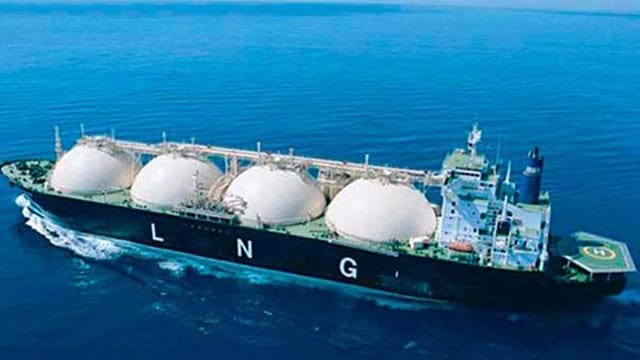The world knows this, and they are simply pleading with Canada to unlock its full potential
 Canada’s natural gas producers and supporters have long touted that a strong liquefied natural gas (LNG) sector could provide two critical benefits: Canada would benefit economically by diversifying our buyers, and second, lower emissions Canadian LNG could potentially displace emissions intense coal consumption in Asia and help lower world emissions.
Canada’s natural gas producers and supporters have long touted that a strong liquefied natural gas (LNG) sector could provide two critical benefits: Canada would benefit economically by diversifying our buyers, and second, lower emissions Canadian LNG could potentially displace emissions intense coal consumption in Asia and help lower world emissions.
With the advent of the Russian invasion of Ukraine, there is a third reason to support exporting Canadian gas to international markets: increased energy security for Canada’s allies.
Those skeptical of these claims can look no further than the trade mission to Canada by Japan’s Prime Minister Fumio Kishida. Kushida’s visit – not unlike German Chancellor Olaf Schulz before him – to Canada was accompanied by what should be an uncontroversial ask: Kushida wants to replace their Russian natural gas imports with LNG imports from Canada. Canada, for its part, seems to agree that the proposal makes sense, with Minister of Natural Resources Jonathan Wilkinson highlighting the progress on LNG Canada and advocating for a further strengthening of the energy relationship between Canada and Japan.
 |
| Related Stories |
| Haisla Chief frustrated waiting on regulatory decision for Cedar LNG
|
| B.C. Canadian LNG can have a domino effect to help Europe
|
| Asia offers huge payoff for Canadian LNG producers
|
For a country like Japan with minimal domestic gas production, a reliable natural gas supply is critical to its energy security. Japan imports more than 100 billion cubic metres (bcm) of natural gas per year, and, according to the IEA, these imports make up 90 per cent of their domestic consumption. With the need to secure natural gas access being so central to energy security in Japan, it is little wonder why Japanese companies are financial stakeholders in LNG export facilities all around the world. These partnerships include Japan’s involvement in Russia’s Sakhalin 2 LNG project north of Japan in the Sea of Okhotsk, which is likely seen as necessary to secure future supply.
Canada, which currently produces over 150 bcm of natural gas annually, presents an obvious solution to Japan’s gas needs. And Kishida’s proposal reflects this. His hope is to replace the approximately nine per cent (nine bcm) of Russian gas currently imported from Russia with gas from Canada.
The Japan-Canada LNG connection is, in many ways, the ideal match even beyond the obvious gas market synergies. Both countries have strong existing bonds, highlighted by integrated economies and similar value systems. But Canada has other significant advantages to serving the Japanese LNG market that other exporters do not share.
First, Canada’s west coast is closer to Japan than American export facilities. This reduced distance means reduced transport costs and lower associated emissions. It would also allow the American LNG industry to continue to serve European markets and reduce Japanese dependency on LNG exports from Qatar and Oman, LNG that could be rerouted to satisfy growing European and more easterly Asian demand.
There also exists a direct business connection between Japan and Canada: the Mitsubishi Corporation is a partner in LNG Canada – Canada’s largest LNG facility currently under construction – owning 15 per cent of the project. That means it has a strong commitment to Canada’s emerging LNG industry – and is committed to the long-term success of LNG Canada, which is expected to operate well into the mid-21st century.
LNG projects and their associated offtake agreements are, by nature, long-term. Late last year Germany – which also asked Canada for natural gas – recently entered a 15-year agreement with Qatar to supply LNG, and Japan entered a 20-year commitment to purchase LNG from a facility in Louisiana. If Japan and Canada can finalize a similar deal, we could be the reliable long-term provider of natural gas they need.
In a world where energy and natural gas demand is only expected to grow, such a deal would lend strong support for the continued development of LNG export facilities along Canada’s west coast. It could transform Canada’s LNG industry and grow our standing and influence in our capacity to provide the world with the natural gas it requires. A notable example is the approval and expansion of the LNG Canada facility; building the second phase of the project would allow the facility to double its exports to 28 million tons and, in turn, mean that Canada could satisfy even more world natural gas demand.
Canada has an economic opportunity to provide gas to the world and a meaningful opportunity to lessen Russia’s energy influence abroad. We can simultaneously meet our friend’s energy needs and grow Canada’s geopolitical influence. Prime Minister Kushida’s ask should be taken seriously by Canadians. We have the potential to be a natural gas super-power, the world knows this, and they simply just want us to unlock our full potential.
Lisa Baiton is President and CEO of the Canadian Association of Petroleum Producers.
For interview requests, click here.
The opinions expressed by our columnists and contributors are theirs alone and do not inherently or expressly reflect the views of our publication.
© Troy Media
Troy Media is an editorial content provider to media outlets and its own hosted community news outlets across Canada.

